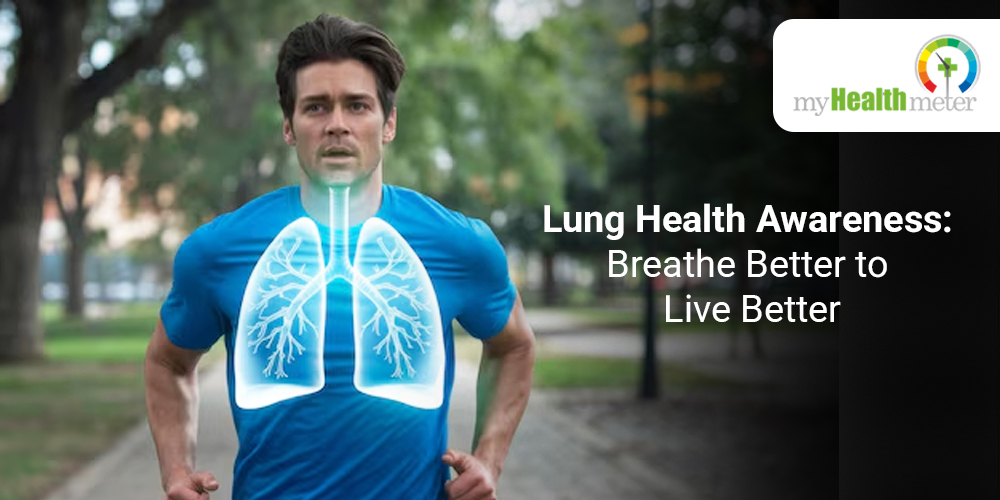Lung Health Awareness: Breathe Better to Live Better
-
September 22, 2025
-
196 Views
Lung Health Awareness: Breathe Better to Live Better
Picture a young child chasing a kite in Mumbai’s monsoon breeze—the joy in every gasp, every sprint, each lungful of air a ticket to freedom. Yet, as dusk sets in, the city air turns dense with smoke and dust, that once-simple breath now a struggle. Across India, millions inhale not just air, but a mélange of pollutants, allergens, and silent threats that erode the miracle of breathing. Behind the closed doors of bustling metros, the stillness of rural homes burning wood fires, or factory lines thick with fumes, the story repeats: the invisible takes a tangible toll on our lungs and our lives.
Why Lung Health Deserves Our Attention
Our lungs are the unsung heroes, quietly fueling every heartbeat, thought, and movement. To mark World Lung Day on September 25th, it’s vital to spread awareness because lung health, once taken for granted, is now front and center in the global health crisis. Diseases of the lung are on the rise not just globally but acutely in India, where urbanization, pollution, and lifestyle choices collide.
The Numbers: Lung Health in India's New Reality
- Chronic Obstructive Pulmonary Disease (COPD): COPD is now the second leading cause of death in India, contributing to 8.7% of total deaths nationwide. The overall prevalence of obstructive lung disease in adults 45 years and older is a staggering 14.4%, with northern and western regions reporting the highest rates.
- Asthma, Bronchitis, and TB: India tops the world in lung disease deaths, with conditions like asthma, chronic bronchitis, and tuberculosis adding to the burden. Pulmonary fibrosis alone constitutes 15% of specialist consultations in metros.
- Lung Cancer: Cases of lung cancer are rising, from 63,700 in 2015 to an expected 81,200 in 2025. Alarmingly, nearly 60,000 Indians die each year from lung cancer, and the fastest rise is among non-smoking women.
- Hospitalizations and Urban Reality: In 2024, there was a 7% increase in respiratory-related hospitalizations among children, and a 5% overall rise in major metros. Delhi NCR, Pune, Mumbai MMR, and Bangalore saw the sharpest spikes, largely due to air quality hitting hazardous AQI levels—sometimes equivalent to smoking 25-30 cigarettes a day, even for non-smokers.
The Roots of the Crisis
- Air Pollution: Urban centers in India face an air pollution crisis, with AQI values regularly exceeding safe thresholds. Inhaling polluted air daily is estimated to have the same health impact as heavy cigarette smoking.
- Tobacco Use: Over 267 million Indians use tobacco, making it the single largest preventable cause of lung disease. Tobacco is responsible for the majority of lung cancer and COPD cases, leading to over a million deaths annually.
- Indoor Air Quality: About 60% of Indian households in rural areas still use biomass (wood, cow dung, crop residue) for cooking, resulting in dangerous indoor air pollution that disproportionately affects women and children.
- Occupational Hazards: Factory workers, miners, construction workers, and those exposed to dust and chemicals are at significant risk due to lack of protective gear and insufficient workplace safety regulations.
- Delayed Diagnosis: Most patients present late, when disease is advanced and options limited. Awareness is low; only about 11-12% of those with chronic obstructive lung disease receive a formal diagnosis in time for optimal intervention.
The Human Cost
From the elderly in Varanasi struggling to climb a flight of stairs, to children in Delhi missing school due to asthma attacks, lung disease is stealing away everyday joys and productivity. The economic cost is massive, with rising absenteeism, reduced productivity, and high medical expenditures weighing down families and the broader workforce.
Why World Lung Day Matters
World Lung Day, observed on September 25th, is a global commitment to change this trajectory. The theme “Healthy Lungs, Healthy Life” highlights how vital it is to foster both prevention and equitable access to healthcare for lung health. It is a clarion call for action from individuals, communities, and policymakers alike.
What Can Be Done? Turning the Tide with Awareness and Action
Air Quality: Protect Where You Live and Work
- Check real-time AQI before stepping out; avoid outdoor activity when pollution is severe.
- Invest in indoor air purifiers if possible; plant indoor air-filtering plants.
Prioritize Tobacco Cessation
- Get professional help to quit smoking; support and counseling are more effective than willpower alone.
- Advocate for and comply with smoke-free workplaces and homes.
Healthier Homes, Healthier Lungs
- Use cleaner cooking fuels (LPG, electricity) instead of biomass wherever available.
- Ensure proper ventilation in kitchens and living areas.
Combat Occupational Hazards
- Use masks and protective equipment if working around dust or chemicals.
- Report any persistent cough, breathlessness, or chest pain to occupational health providers.
Early Warning and Regular Check-ups
- Don’t dismiss a persistent cough, unexplained fatigue, or chest pain – seek medical assessment.
- Periodic health checkups can help detect lung issues early.
Lifestyle Measures
- Adopt regular aerobic exercise, even walking, which improves lung capacity.
- Practice breathing exercises and yoga to strengthen lung function.
- Encourage children to play outdoors in clean air, but avoid high-pollution days.
Drive Awareness and Policy Change
- Spread awareness through local campaigns, social media, and community meetings.
- Advocate for cleaner transport, green spaces, and stricter air quality norms.
Inhale Hope, Exhale Awareness
As World Lung Day approaches, let us remember: every breath is a gift that deserves protection. Whether one lives in a village or a skyscraper, our collective actions can create a legacy of cleaner air, robust lungs, and fuller lives—for ourselves and generations to come. Breathe better, live better; let’s make every lungful count.





